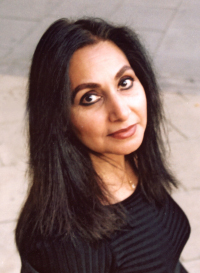
All these poems are from ‘Leaving fingerprints’ by Imtiaz Dharker to be published by Bloodaxe Books UK autumn 2009The missing piece
The whole world has shrunk into a puzzle. Someone is piecing it together. Someone else is looking over her shoulder, the maker in a breathing room. She is building the picture from the outside in. First the gilded border, then the story told in one more jigsawed piece, the intricate teeth fitted perfectly to reveal the glass, the carafe. Look now, here, the princess lost in music, the women playing a drum, a lute, eyes closed, bodies swaying. She lifts another piece and hesitates at a space where nothing fits. Over her hand another hand is joining in, a glove of sunshine from the other time. And there they are, for a moment, The one who made the puzzle, The one assembling it today, The ones who are being assembled, The instruments they are, the ones they play, all the hands poised above a hole in the world, joined in puzzlement.Leaving fingerprints
I know this frosted landscape better than it knows itself, its layers a busy clock of history, still ticking. Under my feet I feel the trail of the slug, the snail, the earth’s deep squirm around an anklet or an amulet, a broken cup. Lost, the names of the ones whose fingers made and used and threw away these things, now dug in, clasped by roots, hugged to the earth’s chest, live. The worm’s heave and turn delivers messages up through folds of soil and mud, afterthoughts that grow to trees, trunks with arms, branches with fingers, twigs with nails, scratches on air, tear after tear on the white page. These names have given their artefacts away to be sparse as winter. Here I am, they say. Here and here for you to see, fingerprinted on the sky.First gift
Don’t expect a silver spoon from me. I would give you this instead. A coral spoon from Turkey, fished out of the Marmara sea where mermaids dined off dolphins’ backs, flicking iridescent tails. A well-used wooden spoon from Russia, scarred by banging against a table, bean and barley flying past the infant’s crumpled face. A spoon discovered in Iceland, carved from horn and frozen in a spoke of frost, lost while the Queen of the Mountain tried to feed the Beast. A shell spoon from Macedonia, a dipper from Peru, a wooden ladle from Fiji made from the magic kava kava root to cause love in unexpected places. Each one fed another mouth and had good daily use. Of all the riches in the world I would give you only this, a simple way to know their lips, to feel the hands that touched the hand-me-down.Ceremony
Bring me from New Guinea the branch of a tree, the coconut shell, the snail-silver clod. Bring me the root and the leaf and the pod to fashion a birth with the hand of the dead. I will work on the mask made of Malaga wood, flesh out its face with fibre and mud, ease through my hands its breath and it’s blood and its half-shaven skull to remember the dead. Draw over my head the Papuan lime. Plant in my eyes the blossoms of fire. Pull over my face the years of desire, the greed of the living to honour the dead. Let his soul pass out of quick clay and bone, give him safe passage, make way through the crowd with feasting and dancing and singing aloud. Let his face live on mine when I laugh for the dead.Landscape with poppies
The sound was the best part, bubbling through the pipes, the way breath and water mix to make happiness. The old women collected round the narghile, cackling, puffing at the reed, till the smoke patted them on the head. The haze above them could belong to poets, but their verses were the names of neighbours, someone’s daughter, the cadence of a joke that made the other women laugh and slap a thigh or clap a hand across a malicious mouth. Sometimes when they were gone I would put my mouth to the pipe and imagine being old and chortling as they did, wickedly. But the chillum is standing in the cupboard now dusty with disuse, as if in disgrace. I asked my grandmother the other day, ‘Shall I get out the narghile? Should I clean the pipes?’ But she shook her head. ‘The times have changed,’ she said.Seed-box
I am lying on my back in this wide field, the earth a drum under my heels, My horizon is poppies lit up by the sun. These flowers are wrinkling tissue, fragile skin on stalks. I am waiting for the red to drop across my mouth and eyes. I am waiting for the surprise of sky when petals fall and pods turn dry, when the wind comes up and rocks my cradle of stems. Then the seeds will jump and rattle inside their hardened box, ready. Ready or not, here I come.